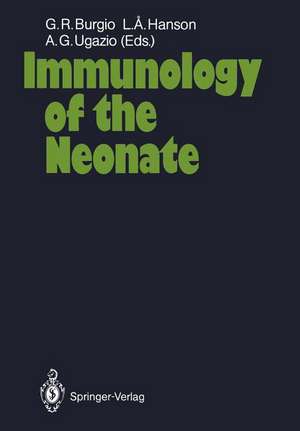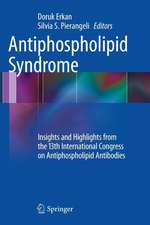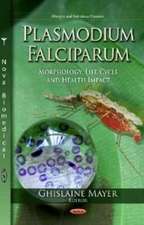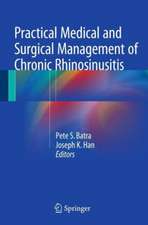Immunology of the Neonate
Editat de G. Roberto Burgio, Lars Ake Hanson, Alberto G. Ugazioen Limba Engleză Paperback – 16 noi 2011
Preț: 712.25 lei
Preț vechi: 749.73 lei
-5% Nou
Puncte Express: 1068
Preț estimativ în valută:
136.30€ • 148.01$ • 114.50£
136.30€ • 148.01$ • 114.50£
Carte tipărită la comandă
Livrare economică 22 aprilie-06 mai
Preluare comenzi: 021 569.72.76
Specificații
ISBN-13: 9783642710964
ISBN-10: 3642710964
Pagini: 204
Ilustrații: X, 188 p.
Dimensiuni: 170 x 244 x 11 mm
Greutate: 0.33 kg
Ediția:Softcover reprint of the original 1st ed. 1987
Editura: Springer Berlin, Heidelberg
Colecția Springer
Locul publicării:Berlin, Heidelberg, Germany
ISBN-10: 3642710964
Pagini: 204
Ilustrații: X, 188 p.
Dimensiuni: 170 x 244 x 11 mm
Greutate: 0.33 kg
Ediția:Softcover reprint of the original 1st ed. 1987
Editura: Springer Berlin, Heidelberg
Colecția Springer
Locul publicării:Berlin, Heidelberg, Germany
Public țintă
ResearchDescriere
Over the last few years, many new observations have profoundly changed our concepts of the immune competence of the newborn. For the immune system, as for other systems and functions, the neonatal age represents a crucial transition period. In fact the immune characteristics of the fetus are likely to result fro- or be conditioned by - several often contradictory physiological requirements. On the one hand, it would certainly be an advantage for the fetus to acquire a complete immunocompetence as soon as possible in order to be able to cope with the eventual transplacental passage of pathogenic microorganisms and possibly also in order to reject maternal cells occasionally crossing the placental nd barrier. This is actually what occurs, at least in part, during the 2 and Jfd month of gestation when the fetus begins to acquire his biological individuality and at the same time the role of a "biological ego" resulting from the attain ment by the immune system of the capacity to discriminate between self and nonself.
Cuprins
Immunologic Development: Introductory Remarks.- T-Cell Development.- Humoral Immunity in the Human Neonate.- Regulation of Antibody Synthesis in the Neonate.- The Ontogeny of the Immune Response: The Role of Maternal Factors.- Mononuclear Phagocyte Function in the Perinatal Period.- Mechanisms of Abnormal Neutrophil Function in the Human Neonate: Prospects for Therapy.- Complement Function in the Neonate.- Modulation of Nonspecific Defense Mechanisms in the Neonate.- T-Cell Development and Function: Relationship to Immunodeficiencies.- Activation and Functional Capacity of Neonatal T Cells: Analysis of Interleukin-2 and Interleukin-2 Receptor Responsiveness.- Development of Lymphocyte Responses to Herpes Simplex Virus Following Neonatal Infection.- T and NK Lymphocyte Subpopulations in the Neonate.- Analysis of the Immunological Dysregulation Underlying Defective Interferon ? Secretion in the Human Neonate.- Immunity and Infections in the Neonate.- Intravenous Gammaglobulin Replacement for Prophylaxis of Infection in Preterm Neonates.- Prevention of Atopy: Neonatal Aspects.- Treatment of Infants with Severe Combined Immunodeficiency by Bone Marrow or Fetal Liver Transplantation.- Summing Up.











